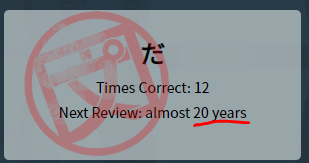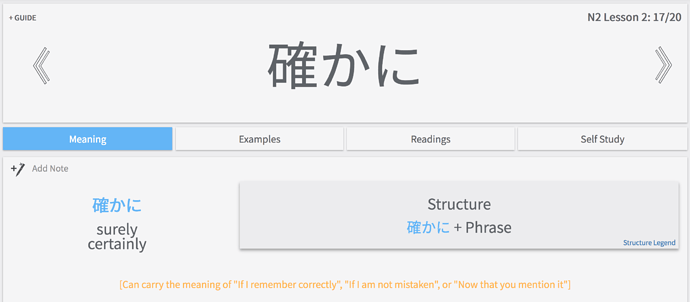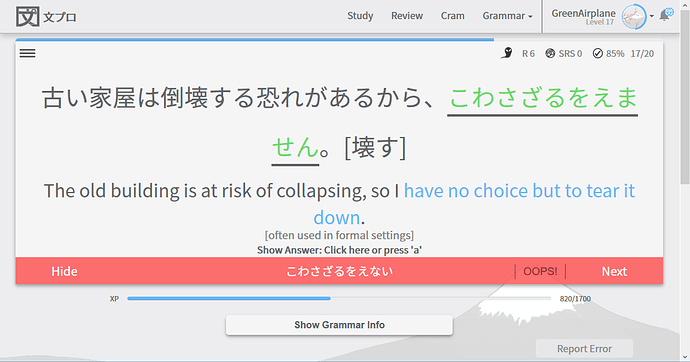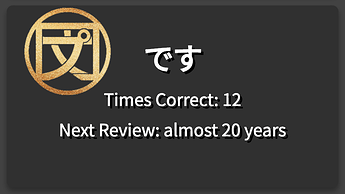I found this example sentence while reviewing:
しっかり休養した だけのことはある 。かなり元気なった。
It belongs to the だけのことはある grammar point https://bunpro.jp/grammar_points/497
Shouldn’t the second sentence say 「元気になった」 instead of just 「元気なった」?
Wasn’t sure where to post this. While talking with my iTalki teacher last night, she mentioned a grammar point that I didn’t see on Bunpro.
We were covering あるいは (which is on Bunpro) and to explain it, she said it was a more formal version of または, which is like another version of the “or” か grammar, but isn’t restricted to nouns like か.
Thought I’d mention it jic. 
@seanblue This is indeed not the most ideal approach. We have removed the 話せるように portion of this answer to place focus on なければならない. Cheers!
@GreenAirplane Thank you for your question. The に in phrases like 元気になる is frequently dropped in casual speech. Both the inclusion and omission of に is correct in this instance. Cheers!
@conan または is on the list of grammar points that we would like to incorporate into Bunpro. However, your comment will be very helpful when we include additional information like formalities and how certain grammar point’s have certain restrictions. Cheers!
hello, is there any ETA about adding the rest of Tobira grammar points? especially since the 2nd half is basically missing more than half the grammar points. I’m wrapping up the final chapter of genki2 with my teacher and expecting to start tobira sometime next week, so it would be great if it would be sooner than later.
Thank you for considering my suggestion.
@blossom Thank you for your question. Once we have 12 example sentences and 12 study questions in for all of N2 (hopefully by the end of next week) then we will start adding additional grammar points. Stay tuned. Cheers!
I have noticed the imperative form is missing in the grammar points, I was wondering if it was going to bunpro at some point, cheers and keep up the good work 
Would it be valid to say 退院するのに?
This “don’t use が” hint was visible right away. Don’t you usually only show hints like this if you try to give that answer?
I don’t think the version with です should be shown as an alternative here given how casual the first sentence was.
You should ask for the whole verb as usual.

Also regarding the dark theme. In the post right above this one, I used --- to put a horizontal rule and it’s not even visible because of the styles. 
Would it be valid to say 退院するのに?
Yes, it is ok to use のに, but REMEMBER that you should not use のに when you order someone else to do something, or request something.
(atm adding alternative answers)
This “don’t use が” hint was visible right away. Don’t you usually only show hints like this if you try to give that answer?
Changed hint to “[casual way to say “but”, “however”]”, what do you think? 
I don’t think the version with です should be shown as an alternative here given how casual the first sentence was.
Fixed!
You should ask for the whole verb as usual.
Fixed!
Thank you very much for letting us know about those, and sorry for the problem! 
In the N2 確かに grammar point, it is explained that it “Can carry the meaning of “If I remember correctly”…” etc. Is this correct?
I thought this applied only to 確か and not 確かに. Just something I thought of as I encountered this lesson today.
I could definitely be wrong about this though.
This is just personal preference, but I like not getting hints about the type of answer you’re expecting. This forces me to cycle through various alternate answers, which helps me remember them too.
That’s still an improvement though, if you prefer that approach.
You might want to find a better way to represent/display burned items.

I like these hints when possible, because this is more or less how I think when I’m speaking/typing Japanese; before I’ve even choosen a single word to say, I should already know whether I want to use casual, polite, or humble/honorific language.
Time to set my calendar 
And get a lifetime membership.
Least I checked that box already  But that’s how they get ya’, haha.
But that’s how they get ya’, haha.
I’m having problems in regards to expected politeness levels with some reviews.
For most grammar points the grammar is the same regardless of whether you use causal speech or the polite ます/です form. Bunpro handles this in one of two ways:
Either both the casual and the polite form are accepted,
or, if the polite form is required, and I type in the causal form, I get told I need to use the polite form.
Sometimes there is also a hint telling me the polite form is required.
There are some reviews that don’t fit the pattern though, like the one in the screenshot. Here I put in the casual form and my answer got marked as incorrect. The polite form of my answer is shown as the correct answer.
To be fair, the hint for the question said “used in formal settings”, but this doesn’t necessarily mean the polite form is expected. There are several other reviews that have the same hint, but accept, or even require the casual form.
This kind of thing tends to trip me up, because I’m not trying to memorize the questions and the correct answers, but rather internalize the grammatical structures and then reproduce them correctly. And as I said, politeness level typically isn’t a part of the grammar point.
Some consistency would be welcome here.
@heisamaniac @Kai
You are absolutely right!
The lesson was supposed to be about 確か in general but in the end we only wrote 確かに example sentences.
Here is a sentence with 確か (if I remember correctly):
確か、あなたの誕生日は3月3日だよね?
@seanblue We think that we got everything covered on the forum side of things. Please let us know if you come across anything else that does not behave the way that you would expect or if there is anything else that you would like to see tweaked.
How does this look?
@Kai and @seanblue We are still experimenting with hints like these. Eventually we would like to make related grammar/similar grammar/synonyms viewable in reviews before you input your answer. This would be a separate, toggleable option to the current hint system and you could choose to turn it on by default or hide it in your settings. Thank you both for your input. Cheers!
@monkeytunes and @conan 


@GreenAirplane Thank you for your comment. As we work our way through all of the grammar points to iron out all of the kinks, this is one of the main things that we are focusing on keeping consistent site-wide.
Very much this! We hope that as we get these items straightened out and as you progress through your reviews that you will come across fewer and fewer reviews that trip you up. Thank you for your patience. Cheers!







